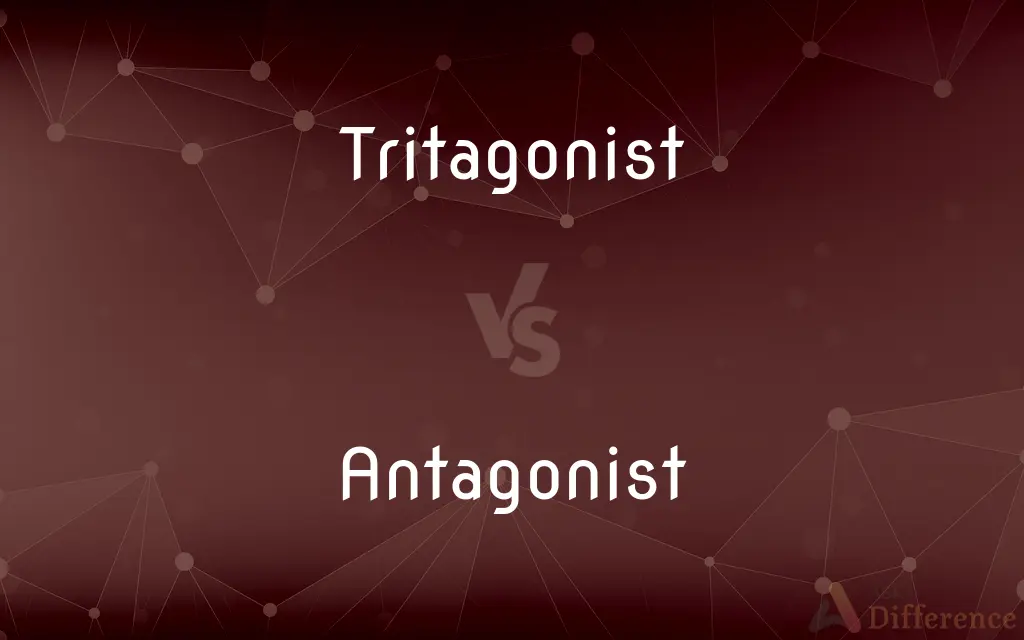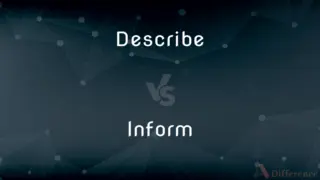Tritagonist vs. Antagonist — What's the Difference?
Edited by Tayyaba Rehman — By Fiza Rafique — Updated on May 6, 2024
The tritagonist is the third most important character in a story, often providing support to the protagonist and additional narrative depth, while the antagonist opposes the protagonist, creating conflict and driving the plot.

Difference Between Tritagonist and Antagonist
Table of Contents
ADVERTISEMENT
Key Differences
In classical and modern literature, the tritagonist serves as the third key player, often pivotal in the development of secondary plots or in supporting the protagonist's journey. Conversely, the antagonist is defined by their opposition to the protagonist, directly challenging their goals and stirring the central conflict of the story.
The role of the tritagonist can be varied—sometimes acting as a confidant, rival, or even a minor foil to the protagonist, contributing to the narrative's complexity and richness. The antagonist, on the other hand, is typically at the heart of the story's conflict, whether through direct enmity or by embodying opposing values.
Tritagonists may or may not be in direct conflict with the protagonist, often providing a deeper insight into the story’s world or thematic questions. In contrast, antagonists are essential for their conflict-driving role, often presenting significant obstacles that the protagonist must overcome to achieve their objectives.
The nature of the tritagonist’s involvement in the plot is usually less intense compared to the protagonist and antagonist, focusing more on enriching the storyline or main characters' arcs. Meanwhile, the antagonist's actions are crucial in defining the stakes and pace of the story, pushing the protagonist towards growth and resolution.
While tritagonists add layers and secondary angles to the narrative, offering audiences a broader perspective on the story’s universe, antagonists propel the narrative forward by their very opposition, making their roles fundamentally catalytic in the unfolding drama.
ADVERTISEMENT
Comparison Chart
Definition
The third most important character in a story.
A character who opposes the protagonist.
Role in Plot
Supports and enriches the main plot.
Drives the main conflict of the plot.
Relationship with Protagonist
Can be supportive or neutral, occasionally adversarial.
Primarily adversarial or oppositional.
Impact
Adds depth and complexity to the narrative.
Creates tension and necessitates resolution.
Narrative Function
Enhances secondary plots and character development.
Central to the development of the main plot and protagonist’s arc.
Compare with Definitions
Tritagonist
The third most important character in a narrative, often providing a supporting role.
In the play, the tritagonist helps reveal the protagonist’s softer side through their interactions.
Antagonist
Can represent opposing ideologies or values to the protagonist.
The protagonist’s confrontations with the antagonist ultimately defined their heroic qualities.
Tritagonist
A character who provides additional depth and aids in the complexity of the storyline.
The tritagonist’s backstory added a rich layer to the film’s historical setting.
Antagonist
A character who opposes the protagonist, often embodying conflict in the narrative.
The final showdown with the antagonist provided a satisfying conclusion to the story’s conflicts.
Tritagonist
Offers alternative perspectives or subplots, enriching the narrative.
The tritagonist’s subplot provided a crucial diversion that enriched the overall plot.
Antagonist
The antagonist’s ruthless business tactics contrasted sharply with the protagonist’s ethical approach.
Essential for developing the protagonist’s character arc and themes.
Tritagonist
Enhances themes or moral queries presented by the main characters.
Through the tritagonist's struggles, the story explored themes of redemption and forgiveness.
Antagonist
The antagonist thwarted the hero’s plans at every turn, heightening the drama.
Often the central figure in the story’s resolution.
Tritagonist
Sometimes serves as a lesser ally or rival within the story.
The tritagonist competed with the protagonist for the same goal, adding tension to their alliance.
Antagonist
Drives the plot by creating obstacles and challenges for the main characters.
Every scheme the antagonist concocted forced the protagonist to adapt and grow.
Tritagonist
In literature, the tritagonist or tertiary main character (from Ancient Greek: τριταγωνιστής, tritagōnistḗs, third actor) is the third most important character of a narrative, after the protagonist and deuteragonist. In ancient Greek drama, the tritagonist was the third member of the acting troupe.
Antagonist
An antagonist is a character in a story who is presented as the chief foe of the protagonist.
Tritagonist
The person who is third in importance, after the protagonist and deuteragonist, in an ancient Greek drama.
Antagonist
A person who actively opposes or is hostile to someone or something; an adversary
He turned to confront his antagonist
Tritagonist
In Greek drama, the actor who played the third role (after the protagonist and deuteragonist)
Antagonist
A substance which interferes with or inhibits the physiological action of another
LSD is a serotonin antagonist
Antagonist
A muscle whose action counteracts that of another specified muscle.
Antagonist
One who opposes and contends against another; an adversary.
Antagonist
The principal character in opposition to the protagonist or hero of a narrative or drama.
Antagonist
(Physiology) A muscle that counteracts the action of another muscle, the agonist.
Antagonist
A drug or chemical substance that interferes with the physiological action of another, especially by combining with and blocking its receptor.
Antagonist
An opponent or enemy.
Antagonist
One who antagonizes or stirs.
Antagonist
(biochemistry) A chemical that binds to a receptor but does not produce a physiological response, blocking the action of agonist chemicals.
Antagonist
(authorship) The main character or force opposing the protagonist in a literary work or drama.
Antagonist
(anatomy) A muscle that acts in opposition to another.
A flexor, which bends a part, is the antagonist of an extensor, which extends it.
Antagonist
One who contends with another, especially in combat; an adversary; an opponent.
Antagonist of Heaven's Almigthy King.
Our antagonists in these controversies.
Antagonist
A muscle which acts in opposition to another; as a flexor, which bends a part, is the antagonist of an extensor, which extends it.
Antagonist
Antagonistic; opposing; counteracting; as, antagonist schools of philosophy.
Antagonist
Someone who offers opposition
Antagonist
A muscle that relaxes while another contracts;
When bending the elbow the triceps are the antagonist
Antagonist
A drug that neutralizes or counteracts the effects of another drug
Common Curiosities
Why are tritagonists important in storytelling?
Tritagonists provide additional perspectives and subplots that enrich the story and deepen viewer engagement.
What is an antagonist?
An antagonist is a character who opposes the protagonist and is central to the story's main conflict.
How do tritagonists differ from antagonists?
Tritagonists support the narrative by adding depth and complexity, whereas antagonists drive the story through conflict with the protagonist.
Can a tritagonist also be an antagonist?
While rare, a tritagonist can occasionally serve dual roles, particularly in complex narratives where their goals conflict with the protagonist's.
What is a tritagonist?
A tritagonist is the third most important character in a story, typically serving to support and enrich the narrative.
How do antagonists influence the plot’s tension and pace?
By opposing the protagonist, antagonists create conflict and tension that drive the plot and influence its pacing and climax.
Do all stories need a tritagonist?
Not all stories have a clear tritagonist; the role depends on the story’s structure and depth.
What makes a good antagonist?
A good antagonist possesses clear motivations, presents formidable challenges to the protagonist, and is integral to the thematic depth of the story.
Can there be multiple antagonists or tritagonists in a story?
Yes, some stories feature multiple antagonists or tritagonists to add complexity or expand the narrative scope.
How do antagonists affect the protagonist’s development?
Antagonists challenge and thereby facilitate the protagonist’s growth and realization of personal or narrative goals.
What are examples of tritagonists in popular films?
In many ensemble casts, such as in superhero teams or adventure trilogies, tritagonists play crucial but slightly less central roles compared to the main protagonist.
What are common traits of tritagonists?
Tritagonists often have a personal connection to the protagonist and play key roles in secondary arcs or thematic exploration.
How do tritagonists and antagonists interact in a story?
Their interactions vary, but both roles serve to challenge and deepen the protagonist’s journey and the story’s themes.
Can the roles of antagonist and tritagonist overlap?
Yes, in complex narratives, a character might initially appear as a tritagonist but reveal antagonistic motives as the plot develops.
What happens if a story lacks a strong antagonist?
Without a strong antagonist, a story may lack tension and fail to effectively challenge its protagonist, potentially resulting in a less engaging narrative.
Share Your Discovery

Previous Comparison
Describe vs. Inform
Next Comparison
Implement vs. ConductAuthor Spotlight
Written by
Fiza RafiqueFiza Rafique is a skilled content writer at AskDifference.com, where she meticulously refines and enhances written pieces. Drawing from her vast editorial expertise, Fiza ensures clarity, accuracy, and precision in every article. Passionate about language, she continually seeks to elevate the quality of content for readers worldwide.
Edited by
Tayyaba RehmanTayyaba Rehman is a distinguished writer, currently serving as a primary contributor to askdifference.com. As a researcher in semantics and etymology, Tayyaba's passion for the complexity of languages and their distinctions has found a perfect home on the platform. Tayyaba delves into the intricacies of language, distinguishing between commonly confused words and phrases, thereby providing clarity for readers worldwide.
















































